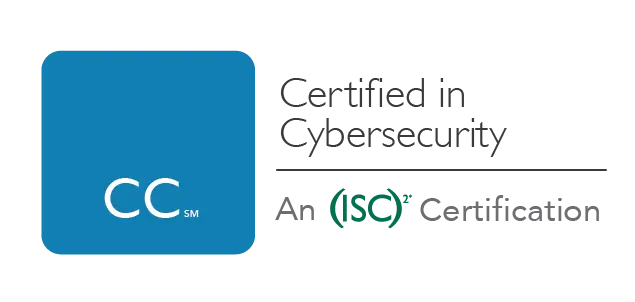*Get our Anniversary discount offer this month! Contact us for details....

ISC2 Certified in Cybersecurity is a foundational cybersecurity certification designed to help recipients build a pathway to a rewarding career in cybersecurity. This entry-level certification will prove to employers you have the foundational knowledge, skills and abilities necessary for an entry- or junior-level cybersecurity role. It proves your willingness and ability to learn and grow on the job.

Start Your Exciting Cybersecurity Career with this Cybersecurity (CC) Certification.
ISC2 developed the Certified in Cybersecurity (CC) credential for newcomers to the field, to recognize the growing trend of people entering the cybersecurity workforce without direct IT experience. Getting Certified in Cybersecurity provides employers with the confidence that you have a solid grasp of the right technical concepts, and a demonstrated aptitude to learn on the job
The Certified in Cybersecurity entry-level certification is ideal for:
- IT professionals
- Career changers
- College students
- Recent graduates
Syllabus
Please check the syllabus tab above. ☝| Domain | Average Weight | No. of Questions |
|---|---|---|
| Domain 1. Security Principles | 26% | 20 |
| Domain 2. Business Continuity (BC), Disaster Recovery (DR) & Incident Response Concepts | 10% | 7 |
| Domain 3. Access Controls Concepts | 22% | 17 |
| Domain 4. Network Security | 24% | 18 |
| Domain 5. Security Operations | 18% | 13 |
| Total | 100% | 75* |
This course covers following topics:
Domain 1: Security Principles1.1 - Understand the security concepts of information assurance
- Confidentiality
- Integrity
- Availability
- Authentication (e.g., methods of authentication, multi-factor authentication (MFA))
- Non-repudiation
- Privacy
1.2 - Understand the risk management process
- Risk management (e.g., risk priorities, risk tolerance)
- Risk identification, assessment and treatment
1.3 - Understand security controls
- Technical controls
- Administrative controls
- Physical controls
1.4 - Understand ISC2 Code of Ethics
- Professional code of conduct
1.5 - Understand governance processes
- Policies
- Procedures
- Standards
- Regulations and laws
Domain 2: Business Continuity (BC), Disaster Recovery (DR) & Incident Response Concepts
2.1 - Understand business continuity (BC)
- Purpose
- Importance
- Components
2.2 - Understand disaster recovery (DR)
- Purpose
- Importance
- Components
2.3 - Understand incident response
- Purpose
- Importance
- Components
Domain 3: Access Controls Concepts
3.1 - Understand physical access controls
- Physical security controls (e.g., badge systems, gate entry, environmental design)
- Monitoring (e.g., security guards, closed-circuit television (CCTV), alarm systems, logs)
- Authorized versus unauthorized personnel
3.2 - Understand logical access controls
- Principle of least privilege
- Segregation of duties
- Discretionary access control (DAC)
- Mandatory access control (MAC)
- Role-based access control (RBAC)
Domain 4: Network Security
4.1 - Understand computer networking
- Networks (e.g., Open Systems Interconnection (OSI) model, Transmission Control Protocol/Internet Protocol (TCP/IP) model, Internet Protocol version 4 (IPv4), Internet Protocol version 6 (IPv6), WiFi)
- Ports
- Applications
4.2 - Understand network threats and attacks
- Types of threats (e.g., distributed denial-of-service (DDoS), virus, worm, Trojan, man-in-the-middle (MITM), side-channel)
- Identification (e.g., intrusion detection system (IDS), host-based intrusion detection system (HIDS), network intrusion detection system (NIDS))
- Prevention (e.g., antivirus, scans, firewalls, intrusion prevention system (IPS))
4.3 - Understand network security infrastructure
- On-premises (e.g., power, data center/closets, Heating, Ventilation, and Air Conditioning (HVAC), environmental, fire suppression, redundancy, memorandum of understanding (MOU)/memorandum of agreement (MOA))
- Design (e.g., network segmentation (demilitarized zone (DMZ), virtual local area network (VLAN), virtual private network (VPN), micro-segmentation), defense in depth, Network Access Control (NAC) (segmentation for embedded systems, Internet of Things (IoT))
- Cloud (e.g., service-level agreement (SLA), managed service provider (MSP), Software as a Service (SaaS), Infrastructure as a Service (IaaS), Platform as a Service (PaaS), hybrid)
Domain 5: Security Operations
5.1 - Understand data security
- Encryption (e.g., symmetric, asymmetric, hashing)
- Data handling (e.g., destruction, retention, classification, labeling)
- Logging and monitoring security events
5.2 - Understand system hardening
- Configuration management (e.g., baselines, updates, patches)
5.3 - Understand best practice security policies
- Data handling policy
- Password policy
- Acceptable Use Policy (AUP)
- Bring your own device (BYOD) policy
- Change management policy (e.g., documentation, approval, rollback)
- Privacy policy
5.4 - Understand security awareness training
- Purpose/concepts (e.g., social engineering, password protection)
- Importance
Certified in Cybersecurity Examination Information
After completing this training, you can appear the ISC2 Certified in Cybersecurity Exam.- Length of exam: 2 hours
- Number of items: 100
- Exam Format: Multiple choice
- Exam fee: Free for limited time. Your trainer will guide you in scheduling this exam in the last training session.
- Passing grade: 700 out of 1000 points
- Testing center: Pearson VUE Testing Center


